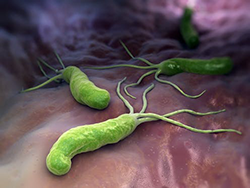Royal Society of NSW News & Events
1288th OGM and Open Lecture
 “Where have all the ulcers gone — long time passing?”
“Where have all the ulcers gone — long time passing?”
Professor Adrian Lee FRSN and
Professor Thomas Borody FRSN
UNSW Sydney (1) and
Centre for Digestive Diseases (2)
Date: Wednesday, 11 November 2020, 6.30pm AEDT
Venue: Zoom Webinar.
Video presentation: YouTube video
This is the first presentation in the series Great NSW Discoveries, a sequence of presentations documenting past and present discoveries that have made a difference. In it, Emeritus Professor Lee and Professor Borody will tell little known stories of the essential contributions by RSNSW Fellows to one of the greatest medical advances in our times. The presentations will be introduced by Emeritus Professor Robert Clancy AM FRSN and the discussions will be rounded out by Emeritus Professor The Honourable Peter Baume AC DistFRSN.
Summary: In 1982 Robin Warren and Barry Marshall at the Royal Perth Hospital described the presence of squiggly bacteria in the gastric mucosa of patients with Peptic Ulcer Disease (PUD).Helicobacter pylori was on the map! They would deservedly be awarded the Nobel Prize for their discovery, which would change the world – medicine would never be the same again. It is not possible for even the modern generation of gastroenterologists to appreciate the way PUD dominated the lives of both patients and doctors 50 years ago — surgical lists were full of patients for gastrectomy, medical wards with patients with uncontrolled pain and complications. Twenty percent of men had a Duodenal Ulcer. Emergency rosters meant bleeding or perforated ulcers. Yet today, PUD is rarely seen – a recent analysis of the impact of H. pylori and its eradication over 25 years in Australia shows a saving of 19,000 deaths, and $10B in costs.
Warren and Marshall would have struggled to develop their ideas without the professional support of Professor Adrian Lee, with a long history of study of “squiggly” bacteria in the gut. His experience in the growth of these bacteria, their role in animal models, and his contributions to diagnosis, vaccine development and the link to cancer, added to the biology and broad understanding of these bacteria, enabling interpretation of the Perth discovery in a biological context. Warren and Marshall understood the importance of eradication to prove causation, but were unable to develop sterilising therapy, so only an association could be claimed. Professor Tom Borody carefully trialled a series of antibiotics to develop the first effective antibiotic combination, enabling for the first time, proof of causation of duodenal ulcers. This began a long sequence of contributions to our understanding and treatment of PUD by Borody including addition of PPI’s, and development of “escape” therapy. He worked with the Newcastle group to develop the first “near-patient” “yes/no” test, and identified a role for the host response in conditioning outcomes of the “host-parasite” relationship.
Adrian Lee will discuss Adventures with spiral bugs and Helicobacter. Adrian’s adventure began in 1967 at the Rockefeller University in New York when he did a post doc with Rene Dubos one of the grandfathers of the gut microbiome. Moving to UNSW in 1969 as a lecturer in Medical Microbiology, he continued his interest in the bacteria of the mouse intestinal tract concentrating on the spiral/helical bacteria that colonised gut mucus. He also worked on the spiral pathogen, Campylobacter jejuni, and then on the organism that Barry Marshall and Robin Warren had grown from gastric biopsies using his culture techniques. Later, he developed the first animal models of Helicobacter pylori infection including the first vaccine studies and demonstration of H.pylori -induced gastric malignancy. For ten years, he travelled the world trying to convince clinicians to treat H.pylori infection. Progressing to Professor of Medical Microbiology in 1990, he also worked as a WHO consultant in medical education. In 2000, he left his beloved spiral bugs to cross to the dark side at UNSW becoming Pro Vice-Chancellor (Education) with a brief to improve the quality of teaching. Retiring in 2006, he carried out consultancies in tertiary education and now writes about his squiggly bugs and runs a choir.
Tom Borody will discuss How we cured Helicobacter pylori infection in Australia. Professor Borody is a world renowned medical doctor from Australia with over 40 years experience in clinical research and practice, including at the St Vincent Hospital in Sydney and at the Mayo clinic in the US. In 1984 he established the Centre for Digestive Diseases in Sydney, overseeing its growth into an active clinical research institute with 65 employees. Professor Borody is most famous for his ground-breaking work developing the triple therapy cure for peptic ulcers in 1987, which has saved hundreds of thousands of lives, and the Australian health system more than $10 billion in medical care and operations. Professor Borody is a leader in the clinical microbiota dating back to 1988 when he started performing what is now called Fecal Microbiota Transplantation (FMT). He holds over 150 patents in areas such as; treatment of Helicobacter pylori, Crohn’s disease, bowel lavage, IBS and FMT.

